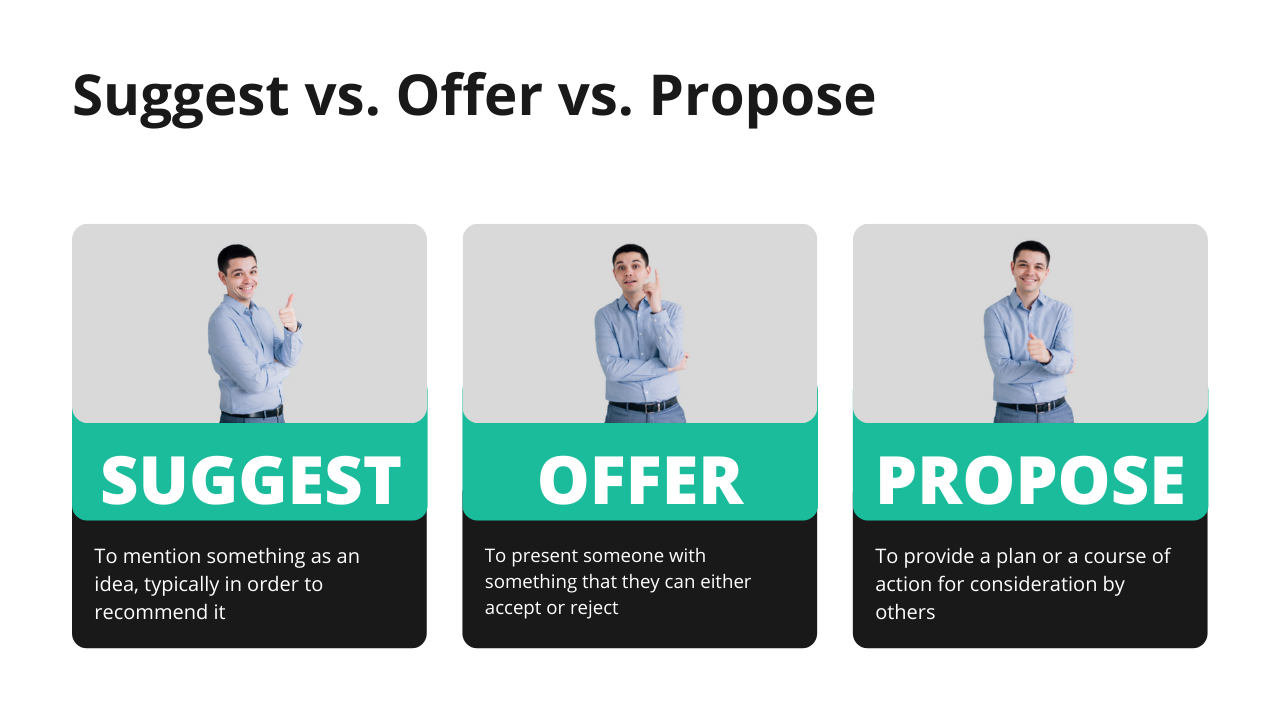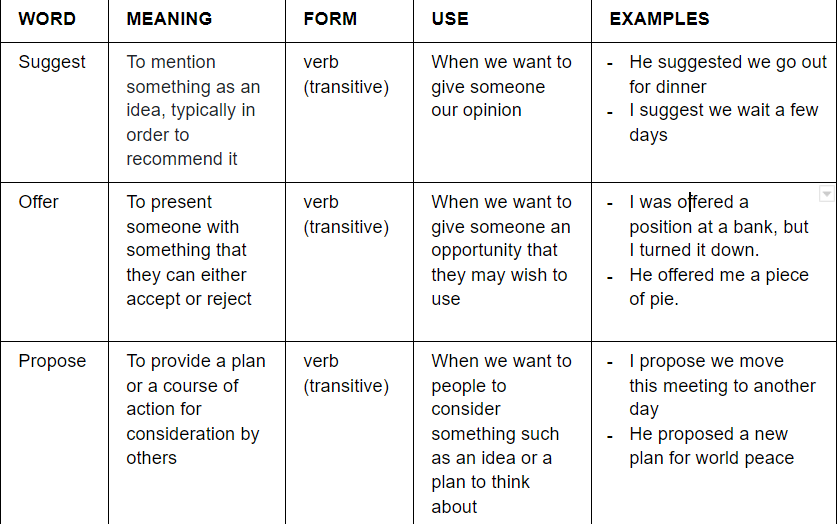Suggest vs. Offer vs. Propose


Synonyms are an awesome part of language learning. They’re a FUN-tastic way to spruce up your writing and sound more like a native speaker! However, this is only possible if you use English grammar correctly. Some words may have synonyms that do not mean the same (please refer to the table above). In fact, depending on the context, they could have an entirely different meaning! So you have to be careful when using synonyms. For instance, if you use the wrong word that is unsuitable for the context, it can change the meaning of your whole message.
But the good news is that there is nothing complicated about these terms! So let’s see what’s the difference between suggest, offer, and propose, and how they are commonly misused and mistaken for each other.
Please see below for a conversation by three native speakers. It is a short discussion between three roommates about their dinner plans.

Alice: Hey guys, I’m starving. Any ideas?
Brian: Yeah I suggest we order in. How about Dominos?
Alice: Great idea! I saw an ad on Instagram where they are offering a 10% discount on delivery!
Carol : No, it’s still too expensive. Guys, remember we went grocery shopping yesterday? I propose we cook something at home.
Suggest
In this conversation, suggest is used to give Brian’s opinion – he thinks they should order Dominos because he feels like having it. This was in response to Alice’s request for ideas on dinner plans.
Offer
Alice seems to really like Brian’s idea to order in from Dominos, because she saw a Dominos ad that was offering (or presenting) a 10% discount on pizza.
Suggest vs Offer
Here suggest is used to give someone’s opinion whereas offer is used to present an opportunity to save money (by using the discount).
Propose
Carol disagrees with Brian and Alice for a good reason (they recently went grocery shopping). Therefore, she proposes (or provides an alternative plan) that they cook dinner at home.
What is English Everyday
English Everyday is an English course with 24/7 live speaking lessons for English learners who want unlimited speaking practice with native speakers, professional teachers, and students from around the world.
You have live speaking lessons where you can join an unlimited amount of lessons every day. There's a lesson almost every hour and you can join all of them and also, you can review all record lessons. English Everyday contains a lot of conversation practice for each level of English (A2, B1-B2, C1), and also you have a calendar of scheduled lessons so you can see when lessons are and at what time you can join and start speaking.
In English Everyday program, you have 24/7 support and also you have student chat where you can speak with other students from all around the world. You can look at our feedback page so that you can know from which countries our students are. Before you join our program, we strongly recommend you sign up for our free seminar with Kris Amerikos, where you can learn:
- What goals you need to have to get better results
- How to become fluent in English very quickly
- What you need to do to have perfect pronunciation
- The 3 biggest mistakes you need to avoid
- Which free resources will help you learn English
- The best resource to use to improve your speaking
Propose vs Suggest vs Offer
In this context, propose is different from both suggest/offer because Carol clearly states the following:
- what she thinks they should do - NOT order Dominos and cook instead,
- why they should do it - it’s too expensive,
- and how they can do it - they just went grocery shopping so they have all the things they need to make dinner at home.
Propose vs Suggest
Propose is different from suggest here because Brian simply provided his opinion on the subject matter (dinner plans) but Carol put forward an idea (eating at home), a plan of action (cooking dinner), and also stated why they should act on her decision (they will save more money).
Propose vs Offer
Moreover, propose is different from offer here because Carol’s statement (or plan of action) is to save her roommate's money by eating at home. On the other hand, Dominos is providing their customers with a discount if they wish to order pizza.
Learning a new language can be very tricky. But if you are now feeling more confident about your abilities in using these words correctly, try doing some practice. Here is a link to a quiz:







































